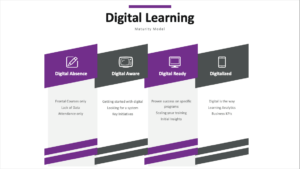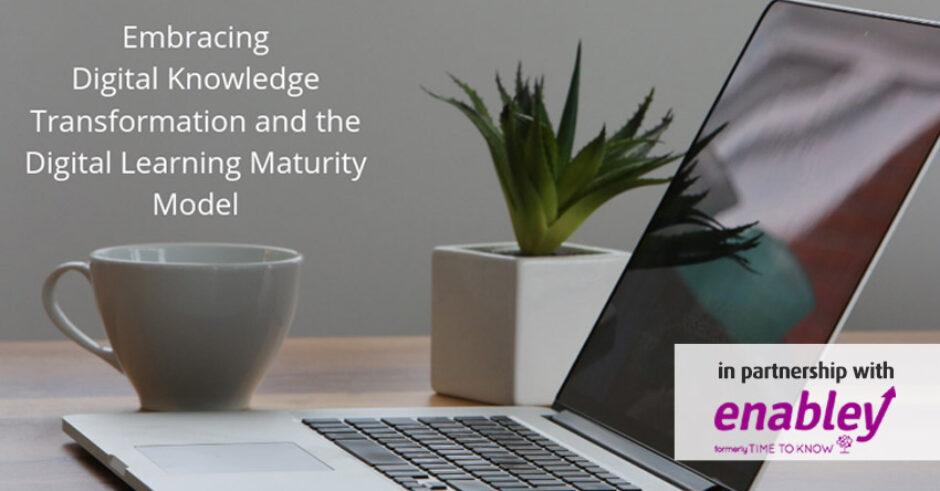The Digital Knowledge Transformation is already here and in full power. By now, you should have a good understanding of what Digital Knowledge Transformation means and specifically what it means for your organization. Here, TIME To KNOW’s Director of Product, Ori Bendet, shares his view on embracing Digital Knowledge Transformation and the Digital Learning Maturity Model.
While the majority of organizations are focusing mostly on modernizing customer touchpoints (54% according to the “State of Digital Knowledge Transformation” by Brian Solis, Altimeter), where most of the effort is being driven by the CIO (28%), there are other important aspects to the Digital Knowledge Transformation that you need to consider.
A lack of knowledge has a direct impact on your company’s bottom line
Regardless of your industry and regardless of how “digital” your organization is, ensuring your employees have the right knowledge to perform their day-to-day activities should be a mission-critical agenda to any business unit manager or executive.
79% of organizations already have or are planning on implementing a sales enablement plan (State of Enablement Report 2019, Highspot). This represents a whopping 20% increase YoY, which means that more and more companies understand the importance of knowledge to their bottom-line.
Think of a sales rep who didn’t know which products to sell or perhaps a customer representative who didn’t know the process of how to handle a damaged package.
Company-specific knowledge needs to be acquired by learning and training and is critical for your bottom-line. While Altimeter has the 6 stages of Digital Knowledge Transformation, TIME To KNOW’s experience with our customers, partners and prospects has given us a wide and personal perspective on the “Digital Learning Maturity” model and what it means to organizations.
Here’s a deeper look at the 4 stages of “Digital Learning Maturity”


Digital Absence –Thiscorrelates to the “business as usual” stage. On a regular basis, you have your “3-day-bring-your-laptop-retreat” frontal training. You (probably) keep track of who attended those events and that’s it. PowerPoints are your strongest weapon and sending them over emails or uploading them to a shared location is considered a success.
Digital Aware – Understanding that having a process with a digital system is something that you need, can save you time and reduce your budget. You want to start the journey to digital learning and still have many frontal courses but are now looking to find initiatives that can easily be digitalized – looking for the success story to help push things up with higher management.
Digital Ready – Let’s say that you have a digital learning system and have successful programs that have gone completely digital. You are now looking for ways to scale your training and learning while looking for ways to improve and get some initial insights and data on how successful your programs are. You want to be able to provide learning on the go – just-in-time, anywhere, anytime and on any device.
Digitalized – Digital is the way to go. Your entire onboarding process is fully digitalized, and you have many previous successful programs that have gone digital. Subject matter experts (SMEs) can easily create new on-demand training programs and quickly distribute them across the organization. You are measuring every bit of training and looking for ways to optimize the efficiency of it. You are looking for RoT – Return on Training, introducing Business KPIs into your programs to ultimately transform training into business results. 
3 factors to consider that can help you in your journey towards Digital Knowledge Transformation
1) The Digital Knowledge Transformation and digital learning are not coming to replace anyone. When trying to introduce a digital learning system, people often think that it will replace their frontal courses. On the contrary, it empowers.
For example, one of our customers was hosting a customer interview workshop in which the first day was focused mostly on how to operate their camera. Rather than spending an entire day in the training center, going over the camera details and how to troubleshoot, they digitalized the first day and were able to focus more on hands-on sessions during the rest of the workshop. This shortens and simplifies training time while having more time to practice.
2) In each of your employees’ bags exists the best training center in the world – their smartphones. Today’s employees want to learn where they are used to learning – from anywhere, any time and on any device.
3) If you can’t measure it – you can’t improve it. This relates to any digital process or system. Whatever you do, make sure you set a baseline of the current status and start measuring your improvements. Bringing data and facts will help you overcome any obstacle you might face along the way.
Regardless of where you are positioned today, you must focus on getting to the next stage of the Digital Knowledge Transformation. The best way to progress is by starting small, generating positive results and ultimately bringing the relevant data to support your success. The evidence speaks for itself – it will be difficult to argue against scaling your success when you can present results that matter to the people who matter.
Find out more about how TIME To KNOW’s digital training platform can help you in the Digital Knowledge Transformation and deliver enriched and interactive training material to all your employees, partners or customers!
*This blog post was written by Ori Bendet, Director of Product at TIME To KNOW*
The Business Transformation Network have shared this article in partnership with Enabley.

